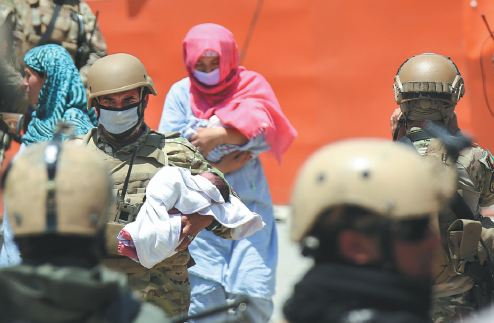Afghan peace bid teetering after attacks
Deadly hits on hospital, funeral see Kabul order new offensive
China Daily Global | Updated: 2020-05-14 09:54

Deadly hits on hospital, funeral see Kabul order new offensive
KABUL/JALALABAD-Afghanistan's floundering peace process appeared further in peril on Tuesday, with security forces ordered to resume offensive operations after attacks targeted a maternity ward and mourners at a funeral.
Gunmen disguised as police attacked a hospital in the capital Kabul, killing at least 24 people including two newborns from the maternity clinic run by the international humanitarian organization Doctors Without Borders, Afghanistan's Deputy Health Minister Waheed Majroh said on Wednesday.
Photos from the country's Interior Ministry showed two young children lying dead inside the hospital. An image showed a woman who had been killed lying on the ground still holding tightly to her baby, who a nurse in the unit confirmed to Reuters had survived and had been moved to an intensive care unit at another hospital.
In a separate attack that day, a suicide bomber struck the funeral of a police commander, attended by government officials and a member of parliament, in the eastern province of Nangarhar, killing at least 32 people and injuring 132. Authorities said that toll could rise.
United Nations Secretary-General Antonio Guterres on Tuesday condemned the attack on the Kabul hospital.
"He reiterates that attacks against civilians are unacceptable and that hospitals, medical facilities and personnel have special protection under international humanitarian law. Those who carry out such crimes must be held accountable," according to a statement issued by Stephane Dujarric, the spokesman for Guterres.
No group immediately claimed responsibility for the hospital bloodshed, but the Islamic State group said it had carried out the attack on the funeral for the police commander.
Islamic State operates in Nangarhar and has carried out a number of high-profile attacks in Kabul in recent months. On Monday, security forces arrested its regional leader in the capital.
Afghan President Ashraf Ghani blamed both the Taliban and Islamic State for the carnage.
"Today, we witnessed terrorist attacks by the Taliban and Daesh groups on a hospital in Kabul and a funeral in Nangarhar, as well as other attacks in the country," Ghani said in a televised address, using the Arabic abbreviation for IS.
The Taliban, which says it has halted attacks on cities under a US troop withdrawal deal, denied involvement in both.
Ghani ordered Afghanistan's security forces to end their "active defense position" and "return to offensive postures, and resume their operations against the enemy".
The move comes months after Afghan forces pledged to only react defensively to Taliban attacks to show good faith ahead of eventual peace talks.
The Taliban have largely refrained from launching major attacks on Afghan cities since February, when they signed a deal with the US meant to pave the way for peace talks with the Kabul government.
The accord will see all US and foreign forces quit Afghanistan over the next year. Thousands of US troops have already gone, with a drawdown to 8,600 expected within months.
Peace deal
In a statement, US Secretary of State Mike Pompeo condemned "the two horrific terrorist attacks" in the strongest terms, noted the Taliban had denied responsibility and said the lack of a peace deal left the country vulnerable to such attacks.
Pompeo also described the stalled peace effort, which was supposed to lead to intra-Afghan peace talks beginning on March 10, as "a critical opportunity for Afghans to... build a united front against the menace of terrorism".
The Pentagon declined to comment on Ghani's stated intent to restart offensive operations, saying only that the US military continued to reserve the right to defend Afghan security forces if they are attacked by the Taliban.
Michael Rubin, a resident scholar at the American Enterprise Institute, likened the peace process to a comatose patient with "no one willing to pull the plug but everyone falling all over themselves with hope if they see an eye blink".
Agencies - Xinhua
























